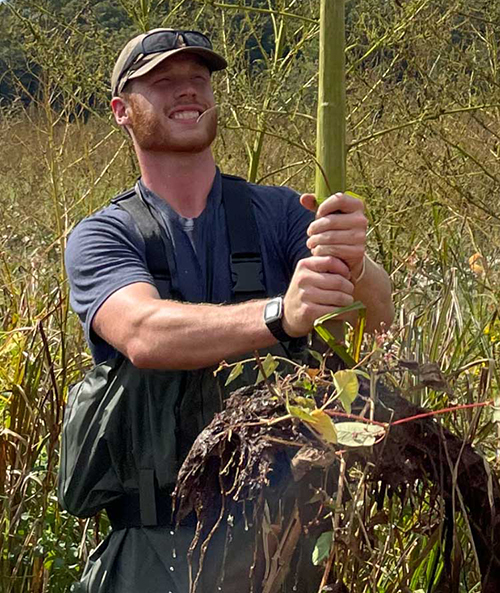AGNR will hold its Winter 2021 Commencement celebration on Wednesday, December 22 at 4:30pm. Jonathan Leathers, who will graduate with a Bachelor of Science in Environmental Science and Technology with a concentration in Ecological Technology Design, has been selected by his peers to serve as AGNR’s student speaker. From Pasadena, Maryland, Jonathan has long aspired to establish a career dedicated to the restoration and sustainable management of the Chesapeake Bay watershed. While at Maryland, Jonathan took every opportunity to learn about his professors’ research and just last summer, he was awarded a National Science Foundation grant to conduct research with Maryland Sea Grant. Outside of the classroom, he could be found playing guitar in the Animal Sciences Building, coaching baseball, and interning with Arundel Rivers Federation. Moving forward, Jonathan has accepted a position with Century Engineering as an Environmental Scientist specializing in stream restoration.
Q: What motivated you to pursue your degree in AGNR?
Pursuing an AGNR degree integrated my passions as a steward, interests as a native Marylander, and strengths as a scientist into a skillset to improve our world and set the foundation for my career. As my understanding of the degradation of our natural resources grew, there was no question as to what I would dedicate my life to. I feel strong resolve to contribute to the restoration of our natural resources and re-connecting humanity to the natural systems that provide us with the gift of life. Is there not a more basic principle a human could fight for?

Q: Tell us a unique and memorable story from your time with AGNR.
I transferred to UMD in 2019 and found a place in the Animal Science building with great acoustics to play instruments and sing. In a “soundproof” place I felt comfortable enough to develop my voice and practice. However, 3 weeks ago as I was walking through the Animal Science building, a woman pointed to my native American flute and asked, “are you the guy that plays all the instruments and sings in this building”? Confused, I told her yes, and asked her how she heard. She then informed me that the “soundproof” area I practiced in for 3 years was completely audible throughout the hallways.
Q: What have you learned throughout your AGNR experience that can help you make your mark on the world?
Nothing exists in a vacuum. The rich diversity of disciplines within AGNR provides insight into how many perspectives are out there. This is important because the best long-term decisions for our environment will only be made by hearing as many voices as possible. Further, in one form or another everyone’s core beliefs and aspirations exist in science whether they know it or not. Keeping this concept in mind, I will strive to make science applicable for everyone I meet.
Q: What are your plans for the future, and how has AGNR helped shape those goals?
Short-term I will begin working at Century Engineering on a stream restoration team. AGNR has helped shape this because of the watershed restoration approach taken in the Chesapeake Bay region. To “fix the Bay”, you cannot simply focus on the Bay itself, but also the inputs to the Bay. Many courses have exposed me to stream restoration as a practical restoration approach. Long-term I plan to return to academia for an advanced degree and to teach. AGNR has shaped this goal because I feel the effort put forth by my instructors should be reciprocated into the generation of scientists that will eventually take my generation’s place. Paying education forward is among the most efficient ways to have a lasting impact on our community.
Q: What advice for others, if any, do you have as AGNR graduates prepare to take their next steps?
We are all about to go through major life changes. As we navigate them, hold these truths close to heart. First, it will all work out- so do not be consumed by stress and adversity. Have faith and press on. Second, avoid complacency- we just graduated so we are “freshman of the world”. Celebrate your achievement, put the diploma on the wall, and get busy because the real work begins now. Third, do not make excuses- failure is a part of life that helps us grow. Be persistent, and do not back down from challenges- you may amaze yourself at what you can do. Lastly, remember you are not alone- you are the result of the love and effort people put forth to you. Hold those you love with an iron grip and make sure they are reminded frequently of how important they are to you.